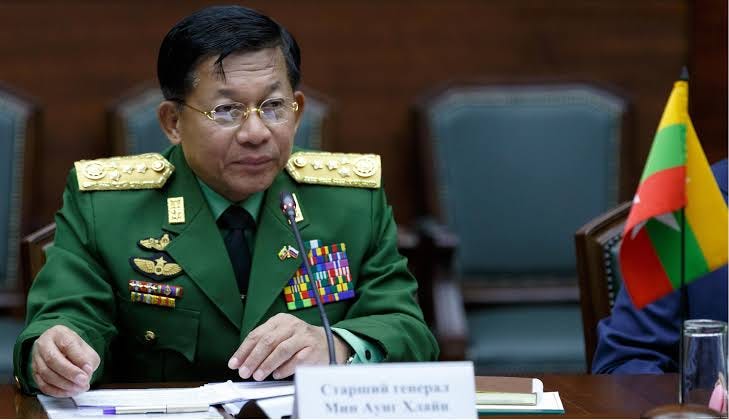Why India should not invite Myanmar coup leader, Min Aung Hlaing, on Republic Day 2022
The optics are bad. And it contradicts India's stated positions on the coup.
According to a report in The Indian Express published on 22 November 2021, the Indian government is planning to invite leaders of the BIMSTEC countries for its Republic Day celebrations on 26 January 2022. This includes Senior General Min Aung Hlaing, the Commander-in-Chief of the Myanmar military and leader of the current coup regime — officially known as the State Administration Council (SAC).
“India is hoping that Prime Minister Sheikh Hasina of Bangladesh, Prime Minister Mahinda Rajapaksa or his brother, President Gotabaya Rajapaksa, of Sri Lanka, Prime Minister Sher Bahadur Deuba of Nepal, Prime Minister Lotay Tshering of Bhutan, Prime Minister Prayut Chan-o-cha of Thailand, and the Chairman of Myanmar’s State Administration Council, General Min Aung Hlaing (MAH), will attend the Republic Day celebrations,” the Express reports states.
This is a bad move for more than one reasons.
First, the optics of it look bad. India's R-Day celebrations next year would fall less than one week before the first anniversary of the military coup in Myanmar (1 February 2022). This would certainly not augur well with the majority of the people in Myanmar, including elected civilian ministers currently organised under the National Unity Government (NUG). India should not alienate them if it wants to maintain its goodwill in the strategically important neighbour.
The people in Myanmar have suffered immensely under MAH's repressive and brutal rule since it snatched state power by force earlier this year. According to the Assistance Association for Political Prisoners (Burma), more than 1280 people have been killed in the country since the coup and more than 10,300 arrested. Under MAH's watch, hundreds have been subjected to enforced disappearances and custodial torture. Further, the US, EU and other countries have slapped various sanctions and asset freezes on the senior coup leadership. The UN-appointed Independent Investigative Mechanism for Myanmar has clearly stated that the regime's violent actions against civilians fall under the ambit of 'crimes against humanity'.
For India to accord a special celebratory invite to such a tarnished individual who is at war with his own people would be a dubious and unfortunate political move.
Second, inviting MAH belies India's own stated positions on the coup. While India has refrained from directly blaming the military for the illegal takeover and the ensuing violence, it has repeatedly thrown its weight behind the process of democratic transition and called for a halt to the violence. For a full list of comments made by India at various forums on the coup, refer to my Myanmar tracker.
To insist on restoration of the democratic process in Myanmar and at the same time, invite (and thus, legitimise) the very person who killed it by the barrel of the gun is a contradiction of epic proportions. New Delhi might not see the R-Day invite as legitimising the coup regime, but for all practical purposes, it would be precisely that.
Third, India's invite to MAH may not be seen favourably by ASEAN, or at least an important faction within the regional organisation. While ASEAN was initially reticent about taking a strong stance on the coup, it has increasingly hardened its position under internal and international pressure. In fact, ASEAN, under the chairpersonship of Brunei, made history last month by refusing to include MAH in its annual summit.
Notably, ASEAN has continued to snub MAH despite China trying to persuade it to include the military chief. He has been barred from attending the ongoing China-ASEAN special summit. This is nothing short of extraordinary, given Beijing's otherwise strong leverage over the regional organisation. It shows that ASEAN won't take even China for granted, forget about India.
New Delhi should take note of these closely if it cares about its relationship with Southeast Asia. Under its grand Indo-Pacific vision, India has regularly backed the idea of 'ASEAN Centrality’ — the normative paramountcy of the regional organisation in regional affairs. But the Narendra Modi government can't talk about ASEAN Centrality and at the same time, do something that directly contradicts the consensus within the organisation. It is risky geopolitics and could play spoiler in it's own outreach to Southeast Asia.
This has also been pointed out by Indian foreign policy analyst, Constantino Xavier, who notes that India's invite to MAH could be seen unfavourably by some members of ASEAN. This would possibly include countries like Indonesia, Singapore and Malaysia.


Here's the bigger point — even realpolitik must have some red lines. Not everything in foreign policy should be seen along the mathematical cost-benefit tangent, certainly not when so much blood is being spilled every day right next door.
Even from a realist perspective, while inviting MAH can have some short-term political, economic and strategic benefits, it can damage India's standing in Myanmar (and Southeast Asia) in the longer term. It would be unwise to believe that this coup regime will last forever. MAH is fast losing ground, getting cornered and dismissed by both old-time friends and foes. India would do well to read the tea leaves.
Update: As tweeted by senior foreign policy journalist, Indrani Bagchi, the spokesperson for India's Ministry of External Affairs has dismissed The Indian Express report as speculative.




